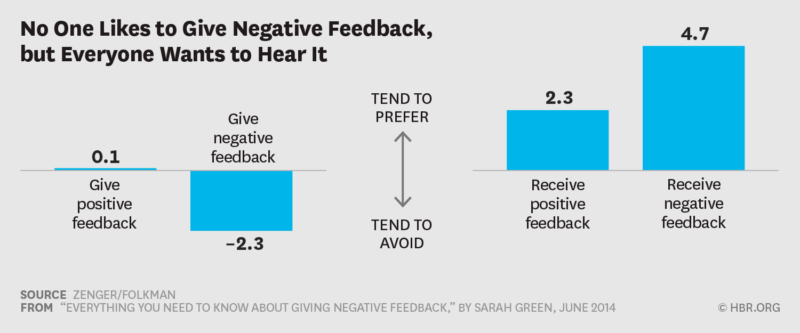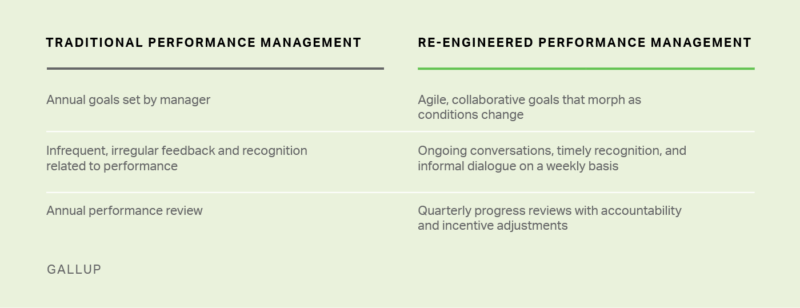
“Performance management” and “feedback” are not always words that receive the warmest welcome in the workplace. Today, while many companies are faced with uncertainty and changes are constantly coming from the top-down, employee feedback is vital and can either rebuild your employees’ motivation to work, or slow down the evolution of constructive dialogue.
According to the Gallup article titled, Performance Management Must Evolve to Survive COVID-19, gone are the days where the traditional performance management style of infrequent and irregular feedback and recognition are the norm; instead, employees need a new system that welcomes “ongoing conversations, timely recognition, and informal dialogue on a weekly basis.”
Consistent and positive feedback is one of the most important things a manager can do, yet, only 14.5% of managers strongly agree they are good at giving feedback. So, why is it that when employees are actually seeking out feedback from their higher-ups, their leadership is hesitant on giving it?
Studies show that feedback is such a vital part of the employee experience that, 90% of employees are actively disengaged after receiving negative feedback, and 80% of employees are looking for other employment after negative feedback (See Bad Feedback Can Disengage 90% of Your Workforce). With statistics like this showing how big of a negative impact poor performance management can create, how do companies ensure that the feedback they are giving to their employees is constructive, positive, and timely enough to provide benefit?
Companies should keep a few key points in mind if they desire to bring a positive and long-lasting shift in their employees’ engagement.
1. Feedback is Key to Engaging Remote Employees
Almost half of employees only receive feedback from their manager a few times a year (or less). Managers need to create “a rhythm of collaboration and shared accountability,” especially amongst their remote employees. The goal for every feedback session should be to realign the purpose of your workers with the overall mission of your company. Both parties need to see the purpose of feedback as more than just a “talk”, it is a time for the employer to show more care and understanding for their employees’ welfare, while also tackling the business’ agenda.
2. Employee Need (and Want!) Feedback
We understand that giving feedback can sometimes be harder than receiving it, but in reality, employees want to hear feedback (whether positive or negative) from management. A study from the Harvard Business Review, shows that employees prefer to receive constructive negative feedback even more than positive feedback. Interestingly enough, the same study found that managers tend to avoid giving negative feedback.

Harvard Business Review
Nevertheless, employees want to hear constructive feedback so they know where they can improve in their line of work. Protecting your employees from negative feedback, not only hurts the business but it can also be detrimental to your employees’ motivation and long-term sense of purpose.
3. Re-engineered Performance Management is the Future

Gallup
As companies continue to transition to remote work, it is important that HR leaders set new goals for their employees. These goals should encourage collaboration and flexibility. By creating an environment that is open to positive feedback, employers will see an increase in workplace motivation from their employees. Open communication also increases motivation and productivity while ensuring employees are feeling valued and satisfied in their position.
4. Systematizing Positive Feedback & Recognition
When implementing better feedback practices, it isn’t as simple as managers just “flipping a switch” to earn rapport from their communication strategies. They must focus on their communication strategy, and implement a long-term vision for correcting it. The feedback process is not going to be an overnight success; rather, managers should understand that this is a gradual race that they are capable of winning. This pandemic has changed the way the workforce views meaningful conversations. The managers’ role should not just be to oversee and delegate, but also, to encourage engagement and foster a healthy performance management routine.
The traditional method of giving one-sided feedback can shed its skin and evolve into a new structure that is “adaptive, responsive, and calibrated to the new workplace.” Employees will gain a different outlook on what positive feedback can be when re-engineered and tailored to the employee’s engagement and the company’s goals.
To that end, WorkProud helps build programs where managers can create efficient, constructive, and engagement-boosting feedback routines. Giving feedback should be a continuous and strategic process that includes reinforcing and driving positive behaviors with the goal of building company cultures where employees are inspired to give their best.
WorkProud is committed to helping its clients create a unified approach to the employee experience by helping them build cultures of workplace pride. Trusted by millions of users at some of the world’s most recognized employer brands, WorkProud delivers a comprehensive approach to building company cultures that inspire people to be Proud of their Work and Proud of their Company.

Every month, we share news, knowledge, and insight into what we believe is a pretty simple proposition: If you are “proud of your work and proud of your company,” you are more engaged, more productive, and more likely to stay with your company for the long haul.
*By selecting “SIGN UP,” you agree to WorkProud’s Privacy Policy. You may unsubscribe from our newsletter at any time. Please note when unsubscribing: it may take up to 10 business days for your request to take effect.